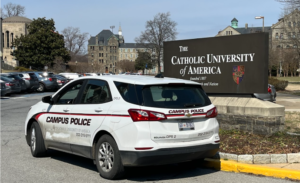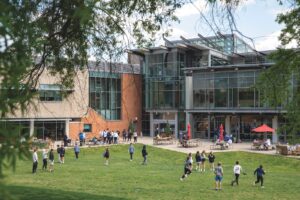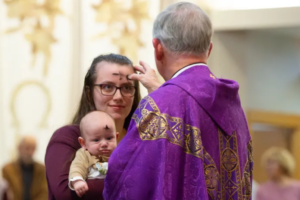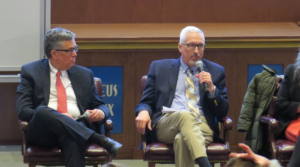The 2020 Election: How D.C. and D.C. Universities Prepared
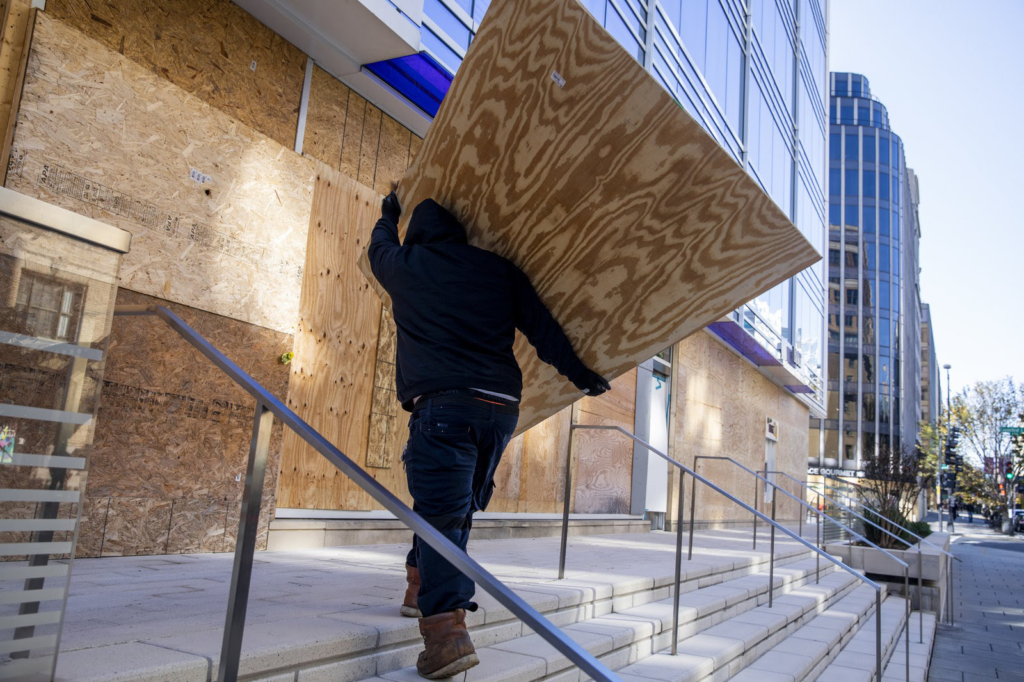
Photo Courtesy of NPR.org
By Angela Hickey
Many large cities have been readying themselves these last few weeks due to the 2020 election, and D.C. is no different. From universities to local businesses, many people prepared for the worst-case scenario when it came to the outcome of the election.
With a majority of D.C. residents having expected Election Day demonstrations to occur, they took the initiative to be ready for any outcome. Although multiple cities had announced that they had plans to keep voters safe, many were still skeptical, wishing to take extra precautions. Shops in cities such as Los Angeles, New York, and Chicago have all decided to board up their storefronts in preparation for any potentially violent or dangerous riots.
As local businesses boarded up in light of the election, as well as any post-election demonstrations, many schools in the D.C. area also began to plan for the then oncoming storm. Georgetown University and George Washington University sent messages to their students informing them of certain precautions that should be taken in case of extreme circumstances.
According to an article by Inside Higher Ed, George Washington University urged students “to be prepared for possible election-related disruptions” that could possibly occur near campus and to stockpile a week’s worth of provisions. A message sent out by Georgetown University listed tips for students living on campus to keep in order to keep themselves safe for the election as well as “several days after.”
Even CUA’s Department of Public Safety (DPS) sent out an email the day before the election sharing the information they had at the time.
“Information from local and federal law enforcement partners have indicated that there are no known safety concerns for the Catholic U community,” stated Kirk McLean, the associate vice president for public safety and emergency management. “The Department of Public Safety will continue to remain vigilant with increased and enhanced patrols around campus while maintaining contact with our university and government partners.”
According to a poll conducted via The Tower Instagram, 56% of students living on campus or otherwise residing in D.C. reported feeling concerned about their safety in the aftermath of the election. Students, such as senior architecture and civil engineering major, Anna Maupin, had this to say about living near campus.
“In general, I feel pretty safe around Catholic, but not so much in downtown DC during this time,” Maupin said. “I live in VA, so I went home over the election in case there were riots or unrest. Mostly because I have to drive through the city to get home, and I didn’t want to be stuck in DC in that case (and I had to vote in VA). However, I feel as though campus and the Brookland area, in general, is safe. I live in a house with great neighbors, and I feel as though everyone looks out for each other. I also don’t see riots coming this far out of center city, especially to somewhere that is largely residential.”
While many students generally reported feeling safe in the immediate area of Catholic University, this feeling does not extend to the greater D.C. area.
“While I am not necessarily worried about anything happening near campus, I am worried about expressing my political beliefs in the greater District,” said senior history major Daniel Madden. “I believe that this is a very volatile time, and feel as though I cannot my political opinion freely.”
Although there are also students who feel as though there’s no need to worry too much.
“I’m not really worried about what might happen post-election, at least personally,” said junior history major Paul Meany. “Living close to campus, I’m not worried because I don’t live downtown or near where riots have happened before. I haven’t done anything to prepare, I feel safe where I am and I don’t really expect things to go south where I live.”
Law student David Korin expressed similar sentiments as Meany and even expressed feeling “optimistic” despite the foreseen protests.
“I expect protests to be concentrated near the White House and not near the school,” Korin said. “Overall, I am feeling optimistic. I trust Americans to protest in a manner that is uplifting and not detrimental. I also trust our institutions to ensure a peaceful transfer of power.
In most communications from other universities, such as Georgetown, the warnings are similar.
“Listen to the news, avoid areas around the White House, U.S. Capitol, and those areas around them,” stated the email sent out by Georgetown professor Dr. Edilma Yearwood. “Keep your phone fully charged and carry only what you need when you go out or commute to Georgetown. Other than that, use extreme common sense.”
For students who are still living on campus, this could be a little nerve-wracking, but the school has stated that students shouldn’t be too worried considering the demonstrations that they’re aware of should be taking place a great distance away from campus.

